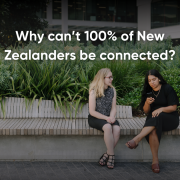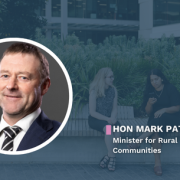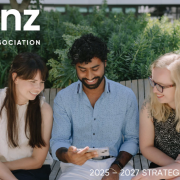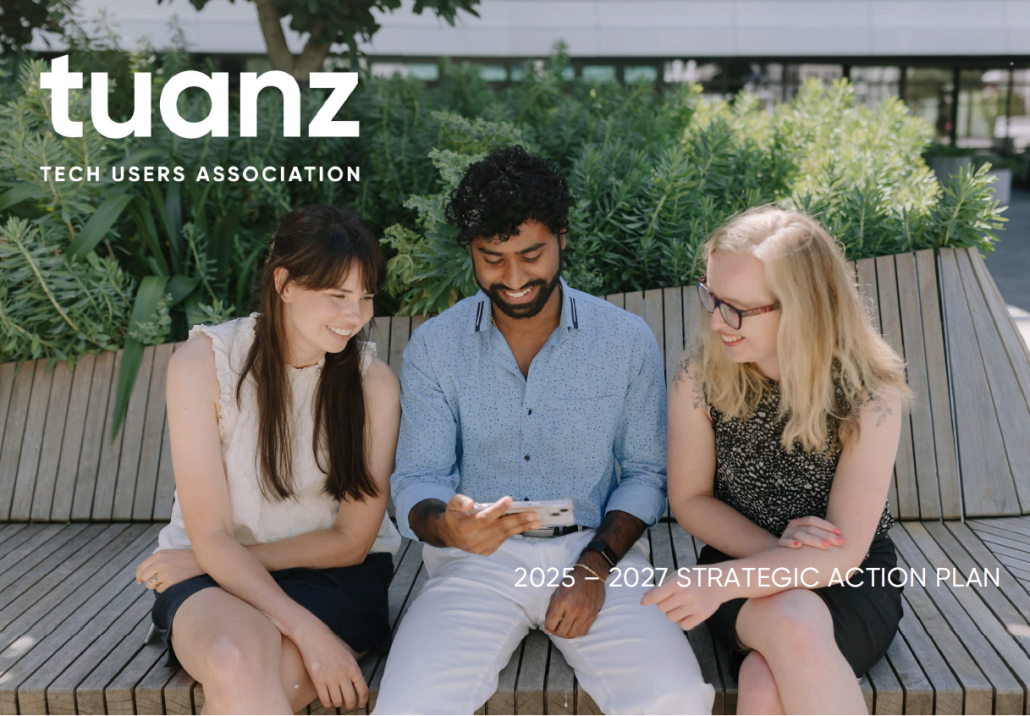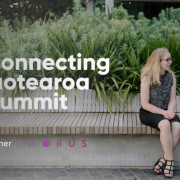Why can’t 100% of New Zealanders be connected?
This was the bold question driving our Connecting Aotearoa Summit 2025 at Claudelands Events Centre in Hamilton. With nearly 200 attendees and a full house, it was clear this conversation is vital for Aotearoa’s digital future. With industry leaders, innovators and community advocates in the room, our summit challenged us all to imagine a truly inclusive digital future.
Inspiration & international insights
Our day began with international lessons from Petra Claessen (BTG President) and Carol Bennett (CEO, ACCAN). They shared global perspectives, reminding us that digital equity is a shared challenge and a shared opportunity.
Emerging Technologies Panel
Facilitated by Adam Beck, with Simone Cuthbert-Scott (One NZ), Sebastian Faxer (Ericsson NZ), and Chris Roberts (Amuri Net), this panel explored how next-gen networks, satellite connectivity, and innovative rural solutions can help achieve 100% connectivity. Key highlights included:
- Next-generation networks:
The panel explored how upgrading to next-gen networks is critical to reaching underserved areas and ensuring high-speed, reliable connectivity for all New Zealanders. - Satellite connectivity:
Discussion highlighted the increasing role of satellite technologies, including Low Earth Orbit (LEO) in bridging gaps where terrestrial infrastructure is not viable. - Rural innovation:
Innovative rural solutions were showcased, including locally-driven initiatives and partnerships that tailor connectivity to the unique needs of different regions. - Building resilient infrastructure:
Ensuring that networks are robust, flexible and disaster-ready was a central theme. The panel stressed the importance of designing infrastructure that can withstand natural disasters and other disruptions, providing continuity of service. - Advancing digital equity:
The discussion emphasised that access to technology should not depend on geography, everyone should benefit from digital advances. - Fostering strong partnerships:
The panel agreed that collaboration between telecommunications companies, technology innovators, and local communities is essential for sustainable and scalable progress toward universal connectivity. - Community engagement:
Panellists acknowledged the value of working closely with communities to co-design solutions that address real-world barriers and ensure lasting impact. - Vision for 100% connectivity:
Ultimately, the panel called for bold, collective action to close the digital divide, leveraging both established and emerging technologies to achieve the goal of 100% connectivity across Aotearoa.
What are we doing to help close digital inequity?
Our panel discussion, facilitated by Victoria MacLennan (DECA) with Pete Bains (BAINZ), Rose Jamieson (InternetNZ) and Lee Timutimu (Our Net) brought real talk and practical ideas:
- “Can we solve digital exclusion for Aotearoa?” Rose Jamieson reminded us to focus on opportunity and impact.
- Lee Timutimu, who is passionate about solving the digital divide, shared how social impact ISPs are challenging the status quo, with pilot programmes set to launch in Northland and Rotorua.
- Collaboration is key: share initiatives, avoid silos, and amplify impact.
- Security, digital literacy, and access to basic services are essential for meaningful inclusion.
- Could you run your life without tech? Look out for No Tech Day, it’s a new national campaign to raise awareness and action on digital exclusion.
Digital access as a right
In his keynote address, Mark Aue, CEO of Chorus, delivered a powerful message:
- NZ’s fibre network is world-class, but 1 in 5 households remain digitally excluded, that’s 400,000 homes.
- To close the gap, we need long-term vision, bold investment and genuine collaboration.
- “It’s not about making money or losing it, we all have a role to play in delivering digital equity and ensuring every New Zealander has the opportunity to connect and thrive.”
- New initiatives like the community co-funded fibre build and proof-of-concept trials for low-income households are steps forward—but scaling impact requires all of us.
Key themes
- Rural Connectivity:
Bridging the digital divide and ensuring access for all, no matter where you live.
“Connectivity underpins the vitality of our rural communities. We must ensure no one is left behind,” says Hon Mark Patterson, Minister for Rural Communities.
“Connectivity is absolutely critical to rural communities, not just for business, but for health, safety and social connection.” - Affordability:
Tackling the cost barriers to access.
“Rural households pay on average 29% more than urban households for their broadband connection,” says Rachael Coyle (Commerce Commission). - Digital Equity:
Promoting inclusivity and participation for everyone.
“There are 130,000 households in New Zealand without an internet connection. Our mission is to improve the lives of all New Zealanders affected by digital poverty,” says Lee Timutimu (Our Net). - Future Connectivity:
Exploring emerging tech and innovative solutions for a connected Aotearoa.
“Digital connectivity must be a right, not a luxury. It’s the backbone of our future competitiveness, productivity, and prosperity,” says Mark Aue (Chorus)
Innovation spotlight:
- Chorus: Expanded its community co-funded fibre build programme, offering up to $3,500 per premise for eligible communities.
- Our Net: Launched as a digital equity ISP, delivering affordable, community-powered internet.
- 3G Shutdown: Paul Brislen (TCF) provided practical advice and tools for consumers and businesses ahead of legacy network closures.
What’s next?
Thank you to everyone who made the Connecting Aotearoa Summit 2025 possible. Special thanks to all our speakers and our premier partner Chorus and gold partner, InternetNZ. We’ll be sharing more highlights and insights in the coming weeks, including our special report: Connecting Aotearoa 2025. Visit tuanz.org.nz to learn more and join our mission to connect every New Zealander.

